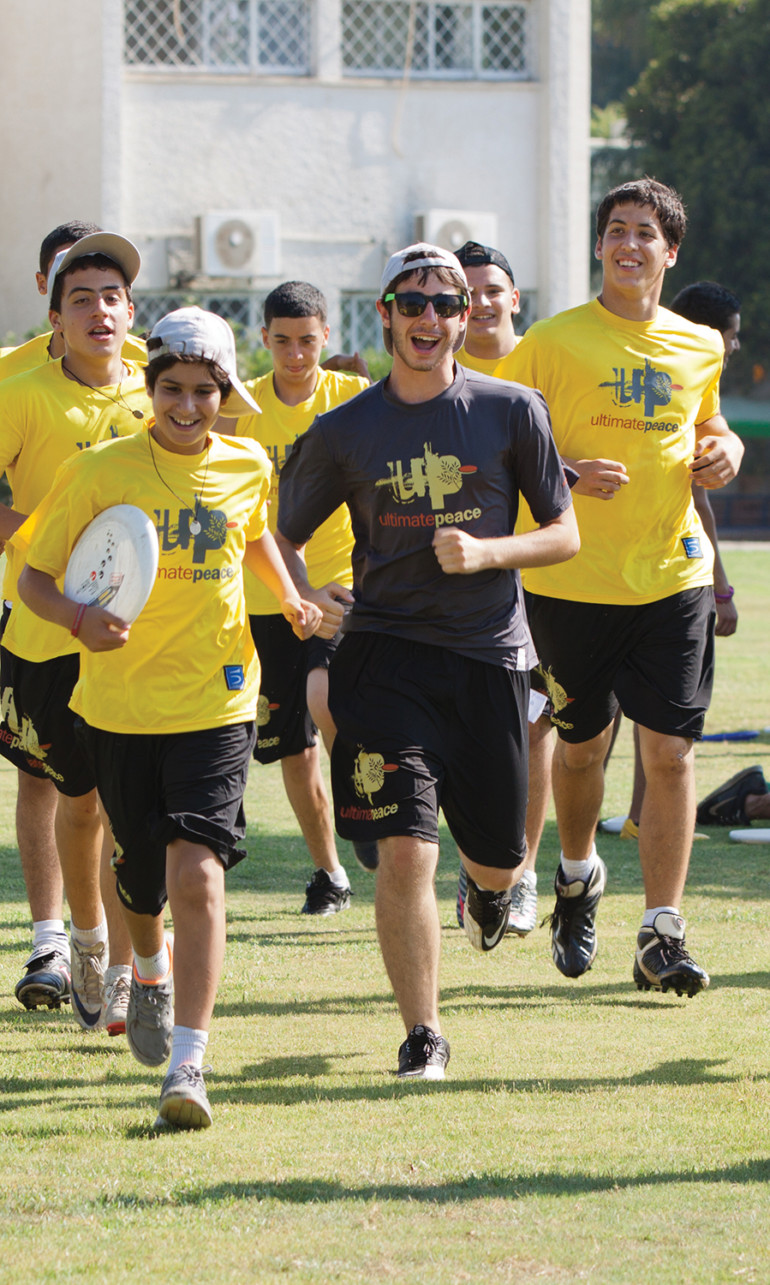Marin County is a community known for its natural beauty, liberal politics and affluence. But it is also a population deeply committed to philanthropy. When it comes to charitable giving, locals are generous with money, time or both. Some take things a step further. When they see a problem not being adequately championed, they start their own charitable organizations to combat it. Meet five area residents who founded nonprofits intended to better the lives of strangers half a world away.
KEN MARTIN
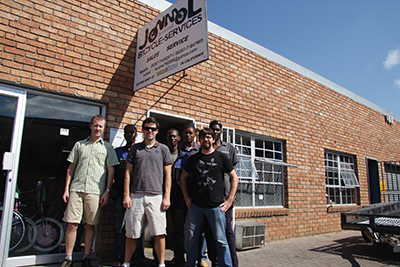
MIKE’S BIKES AFRICA, mikesbikesafrica.com
KEN MARTIN OF Novato and his partner at Mike’s Bikes, Matt Adams, earn their keep doing what many people dream about. They’ve turned a lifelong passion — in their case cycling — into a lucrative business. But their passion for the sport has done more than just put money in the bank. They’re also putting bikes on the streets of dozens of communities in Southern Africa. “In some of the rural communities our bikes provide the only means of transportation other than walking,” Martin says.
Of course, Martin is the first to admit that theirs is not the first or only nonprofit shipping bikes into Africa. “Many programs are well-intentioned, but the first time something goes wrong with the bike, it gets chucked to the side of the road because nobody has the skills or the parts to fix it,” he adds.
To eliminate this problem, the Mike’s Bikes Africa program takes a novel approach. It seeks out local partners in each of the communities it serves and teaches them the basics of how to run a bike shop. “Then we give them the bikes and encourage them to price them at a cost that’s reasonable to the area,” Martin says. “In this way, we give each of our partners a means to earn a decent living. But we also increase the likelihood that our bikes will stay on the streets because the owners then have someplace to take the bicycle when it needs to be serviced.”
To date, the program, which began in 2007, has delivered more than 10,000 bikes to sub-Saharan Africa. And, says Martin, “As far as I know, all are still on the road.”
VICTORIA CRESSMAN
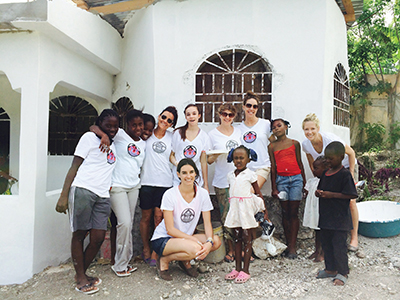
TENTS TO SHANTI, facebook.com/tentstoshanti
DURING A 2012 service trip to Haiti, Victoria Cressman of Mill Valley witnessed firsthand how extreme poverty can devastate a family. She met dozens of children who were living unsupervised in tents provided by humanitarian groups following the 2010 earthquake. “In many cases, their parents were living in other towns trying to get work,” Cressman says. To reunite parents with their children and to literally put roofs over their heads, she and her daughter founded Tents to Shanti, an organization that builds simple but permanent homes made from cinder block and plywood for struggling families in Jacmel, Haiti. “Shanti is a Sanskrit word for peaceful living,” Cressman says.
To date, they’ve completed six homes that now house 25 people. Tents to Shanti doesn’t just build the structures and hand over the keys. Instead, it empowers the beneficiaries to be part of the process. “The recipients find the contractors and work with them to put their own stamp on the structures,” Cressman says. “One woman we worked with, for example, asked the builder to design her home with a space for a retail shop in the front. This allowed her to have a place to live and also to earn a living.”
The organization, which gets its funding through the Marin Community Foundation, has also helped build a Creole language library and put a dozen students through school. “We are a small charity, and progress is slow, but we are making a difference,” Cressman says.
BARRY HOFFNER
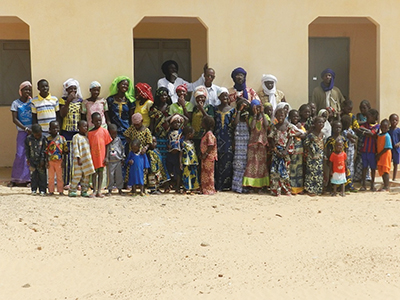
CARAVAN TO CLASS, caravantoclass.org
BARRY HOFFNER OF Sausalito loves to travel. So he decided to mark the occasion of his 50th birthday by attending a music festival in Timbuktu. “It was a place I’d always read about as a kid,” he says of the destination fabled to be in the middle of nowhere.
One morning he awoke in Timbuktu and decided to take a camel ride to a nearby village (off the beaten path from the middle of nowhere). During his visit, he struck up a conversation with the village leader and his wife. “I asked them what their village needed most, and they both agreed it was a school,” says Hoffner. “I didn’t ask because I was looking for a project or planning on any humanitarian effort. I just kind of got swept up with the feeling that maybe I could do some little thing that might help.” After he departed, the conversation stuck in his head. “And after thinking on it some more, I decided if I could make it happen, why not.”
Of course, the logistics of overseeing the building and staffing of a school in a remote village while living in Marin County are not without complications. But he kept to his commitment and built a school in the town he visited. “After going back and seeing the first school built, I remember kind of saying to myself, ‘Show me a sign to continue this and I will,’” Hoffner says.
Shortly thereafter, he received an unexpected grant from a private family foundation; “this was a turning point, and the anchor funding for our second school.” To date, Caravan to Class has built five schools and financially supports an additional three throughout Mali. In each of these cases, the children are the first generation in their village to be literate.
DAVID BARKAN
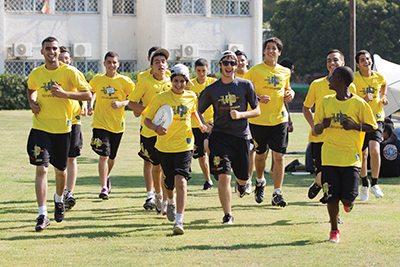
ULTIMATE PEACE, ultimatepeace.org
THE TENSION IN the air was palpable in the weeks leading up to last summer’s seven-week conflict between Hamas and Israel. “A few rockets had been shot in the south from Gaza, and the search was on for three kidnapped Israeli teens,” says David Barkan of San Anselmo, founder of Ultimate Peace, an organization that strives to defuse conflict and encourage respect for cultural differences through its Ultimate Frisbee camps and clinics. “People were definitely on edge.” Nevertheless, he and a team of more than 80 volunteers from around the world arrived in Israel to bring together a group of 200 Jewish, Muslim and Christian Arab children for a weeklong summer program. “We don’t talk politics there,” Barkan says. “But they learn to build trust in one another by working as a team.”
The idea for Ultimate Peace took shape after Barkan, whose own team won the 1995 Ultimate Frisbee World championship, attended an Israeli Frisbee tournament in 2003. “I retired after my 1995 win, but decided to form a new team I named the Matza Balls because it was made up of old and young Jewish players,” says Barkan. “Anyway, somehow the Israeli event organizers heard about us and invited us to be part of their tournament.” The Matza Balls also agreed to run some free clinics to boost interest in the sport, which was just starting to catch on in Israel.
Though the clinics were well attended, Barkan noticed that only Jewish athletes showed up. That’s when it occurred to him that the game he loved was also a great way to build cultural bridges. “It’s a game that teaches conflict resolution skills because even at the most competitive levels there’s no referee,” he says. Ultimate Frisbee also hews to the credo that while winning is important, it shouldn’t come without earning the respect of your opponent. “It’s not about throwing an elbow and hoping you won’t get called for it,” Barkan says. “It’s about learning to self-regulate.”
In addition to its summer camp, Ultimate Peace sponsors year-round leagues in 18 communities throughout Israel and the West Bank. Often parents are ambivalent about letting their kids participate. But according to Barkan, they usually come around: “Often it’s the parents who were most resistant who become our biggest supporters.”
OLGA MURRAY
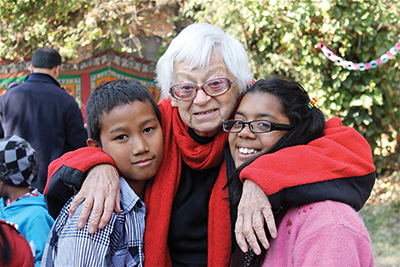
NEPAL YOUTH FOUNDATION, nepalyouthfoundation.org
IN 1984, THEN 59-year-old Olga Murray decided to travel to Nepal. “I knew nothing about the country,” she recalls, “but I was already in India and had heard it was a great place to go trekking.” What she found was a country filled with kind, hardworking people, most of whom were unbearably poor. “The children I met were dressed in rags, dirty and malnourished but also the happiest kids I’d ever seen.”
While on a trek, she ended up meeting a Nepali man who was glowing with pride as his three children completed their homework in their dirt-floored home: “He was so proud they went to school because at the time it was an opportunity few Nepali kids had.” And as it happened, Murray was just recently contemplating how she would keep busy in her retirement years. “I got back in my sleeping bag that night and said to myself, ‘you know what, I’m going to educate the children of Nepal.’”
It began with a personal check that allowed five Nepali orphans to attend college. On a subsequent trip, Murray broke her ankle and ended up in the clinic of a doctor in Katmandu who had opened a small hospital committed to treat poor disabled children. “They had no way of getting to school in their villages so I collected money from family and friends to pay for them to attend boarding school in Katmandu,” says Murray. By 1990, she had raised the money for 200 scholarships and decided to start a foundation to help in a more organized way.
Aside from providing scholarships, NYF effects change in a variety of ways. Projects include establishing 16 hospitals to treat malnourished children and educate parents about nutrition and child care; rescuing girls who have been sold into slavery; and providing homes for children with severe disabilities as well as those who have been abandoned or orphaned. Next year, NYF turns 25 and Murray turns 90 — but she has no plans to give up her retirement job.
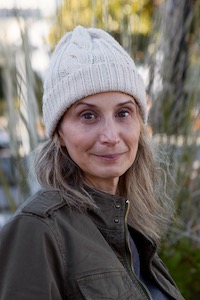
Dawn Margolis Denberg has worked as a professional journalist for 20 years. Her work has appeared in top publications, including Wired, Shape and Parenting. She has also written several books for children including, The Men in Black Agent’s Manual The Official Godzilla Movie Fact Book. And, most recently, an episodic audio series for Tales Untold.

